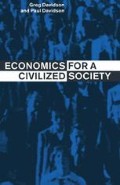Abstract
Newtonian physics postulates that every action has an equal and opposite reaction. Similarly, it is a conservative argument that every economic benefit must exact a cost somewhere else. They view everything in the world as a trade-off, or as the current slang goes: TANSTAAFL (‘there ain’t no such thing as a free lunch’).
My bounty is as boundless as the sea, My love as deep;
The more I give to thee the more I have For both are infinite.
(Romeo and Juliet, Act II, Scene ii)
Access this chapter
Tax calculation will be finalised at checkout
Purchases are for personal use only
Preview
Unable to display preview. Download preview PDF.
Sources and References
Christopher Lasch, The Culture of Narcissism: American Life in an Age of Diminishing Expectations (New York, W. W. Norton, 1978). The Politics of Aristotle, ed. E. Barker.
Mancur Olson, The Logic of Collective Action: Public Goods and the Theory of Groups (Cambridge, Mass: Harvard University Press, 1965).
Thomas J. Peters and Robert H. Waterman, In Search of Excellence.
Lee Iacocca with William Novak, Iacocca: An Autobiography (New York: Bantam Books, 1980).
John T. Dunlop, Dispute Resolution (Dover, Mass.: Auburn House Publishing Co., 1984).
Steven Kelman, What Price Incentives? Economists and the Environment (Dover, Mass.: Auburn House Publishing Co., 1981).
Robert Bellah et al., Habits of the Heart.
Nation’s Business, April 1968.
Barry Schwartz, ‘Reinforcement-Induce Behavioral Stereotypy: How not to teach people to discover rules’, Journal of Experimental Psychology, vol. 111, No. 1, 1982.
Thomas C. Schelling, Macromotives and Microbehavior (New York: W. W. Norton, 1978).
Benjamin Barber, ‘A New Language for the Left: Translating the Conservative Discourse’, Harper’s Magazine, XX, November 1986.
Author information
Authors and Affiliations
Copyright information
© 1988 Greg Davidson and Paul Davidson
About this chapter
Cite this chapter
Davidson, G., Davidson, P. (1988). The Political Economy of Civilization. In: Economics for a Civilized Society. Palgrave Macmillan, London. https://doi.org/10.1007/978-1-349-19244-1_2
Download citation
DOI: https://doi.org/10.1007/978-1-349-19244-1_2
Publisher Name: Palgrave Macmillan, London
Print ISBN: 978-0-333-43929-6
Online ISBN: 978-1-349-19244-1
eBook Packages: Palgrave Economics & Finance CollectionEconomics and Finance (R0)

